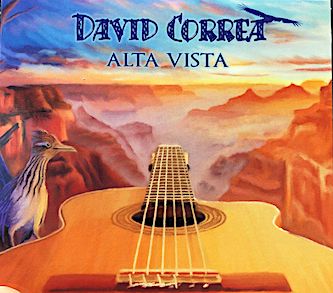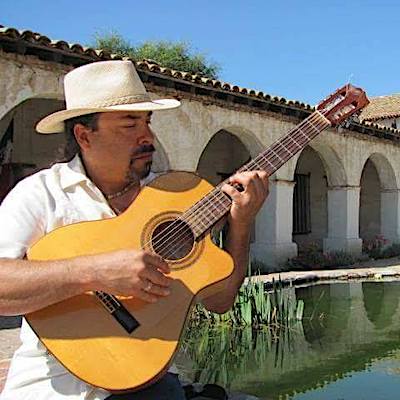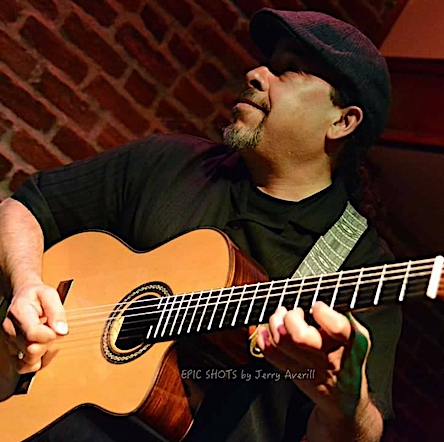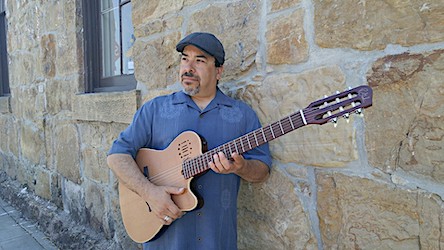 
|
||||
|
|
DAVID CORREA |
|||
|
mwe3.com presents an interview with
David Correa: The Pandemic has had a world-wide effect in the music business shutting down the biggest names in the industry all the way down to independent touring musicians such as myself. If there is a silver lining to all this that would be the fact that musicians have found a way to “live stream” their performances on social media which had not been done before on such a frequent and large scale. Here in the Bay Area some counties have slowly begun to reopen and have live music outside which is a good sign of things eventually returning to some sense of normalcy. mwe3: I was so glad to hear your new album Alta Vista. I hadn’t heard an album from you since 2015’s New Moon. Contrast making Alta Vista album with that of New Moon, which came out on the Baja / TSR label. Tell us about recording Alta Vista. David Correa: For Alta Vista I had Latin Grammy award winning producer and engineer Oscar Autie record 8 of the 10 tracks. Alta Vista is a work that basically came to fruition in 2019 when the band went in to the studio to record. The songs on the CD were written between 2016 and 2019. The musicians that are on this recording are the guys that are currently in my “live” performance band. Whereas for my 2015 release New Moon I had used session players from Los Angeles and from the San Francisco Bay Area. I am very proud and pleased with the way the production turned out. mwe3: Tell me about your Zocalo Records and contrast that with working on the other label you worked with on New Moon. How many albums have you recorded and released and have you done a lot of sessions playing guitar on other albums too? What became of Baja / TSR?
mwe3: Can you say something about the way you recorded Alta Vista in the studio? Was it done live with the other players in the same room and were there any overdubs? Do you have a special technique to mic your guitar when you record? David Correa: We recorded the percussion and two guitars live in the studio in our own separate isolation rooms. There are very few overdubs and I usually do a scratch take for the guitar solos and, depending if I like it or not, I will do two or three takes to get the perfect one that I feel is best. Later we had the bass player record his parts from his home studio. With the amazing wonders of today’s technology, we are able to send him the Pro Tools recording session files and he plugs it in to his computer and is able to open it up on his end for him to record his bass tracks. Once completed he sent it back and the engineer added his tracks to the overall mix at the studio. As far as recording techniques for my guitar, I typically use 3 mics. One for the sound hole, one for the neck area usually in an “X” pattern, and an overhead capturing the overall sound. mwe3: What are your live show like? They must be very exciting to see you live with good lighting and sound system to hear it in the crowd? Can you forecast what the state of live music will look like next year? David Correa: Besides performing locally at some of our favorite venues, we mostly perform at Summer Concerts in the Park series, theaters and music night clubs. The summer concerts can be fun because families with small children come out to the show and everyone of all ages has a blast. Theater shows and night clubs such as Blue Note or Yoshi’s are more intimate. As far as next year, all I can hope for is that things return to normal for the live music industry.
David Correa: As far as the latest in guitar land I like to keep up with the latest models that come out from the various companies. On “Eau Rouge”, I used a Godin Session which is one of the companies that I endorse. “Eau Rouge” means red water in French. Long story short, I am a Formula 1 race fan and Eau Rouge is a world-famous turn at Spa-Francorchamps Circuit in Belgium. mwe3: Except for that track, you mostly wrote and recorded everything with your Cordoba guitars, right? Do you have an endorsement with Cordoba? How many Cordoba models have you played and which one is your favorite? What other guitar builders are you interested in these days? Are there guitar builders all over the world that you like? David Correa: On the other nine tracks on the recording I used a Godin Multiac Nylon and my Cordoba GK Pro Negra. I used to have an endorsement with Cordoba but have focused more on endorsing Godin guitars. I also have a Cordoba CWE-S made in Spain, which is what I used to use regularly before I acquired the GK Pro. mwe3: Has your choice of guitar strings change? What are you playing on the new album? David Correa: I also endorse Savarez guitar strings. They are based in France. I use their Creation Cantiga high tension line of strings. Although I occasionally go back to the original classic Savarez 520 J series of strings. mwe3: You say your sound is pure Spanish/Latin guitar but not purely flamenco. How would you describe the sound you recorded on the Alta Vista album? David Correa: There are some tracks on Alta Vista that have elements of Flamenco such as “Tamarindo”, which is inspired by a Fandango form and “Correcaminos” has an uplifting Rumba rhythm. For the most part it is primarily traditional Latin rhythms. The genre that I play has been called many things from Nouveau Flamenco, Rumba Flamenco, World Guitar, Latin Guitar and other names, because of today’s power of social media, I have become friends with most of the guitarists of this genre and I can honestly say that they all inspire me to some degree.
David Correa: I keep in touch with most of the instrumental Latin/Spanish guitarist from L.A. like Jim Stubblefield, JP Durand, Luis Villegas, Yussi Wenger, Roger Espinosa and a few others. The list is long, there are players in Arizona, New Mexico, Texas, Florida and the Chicago area and I have had a strong acquaintance with them. I think the genre is stronger than ever with many new names stepping in to contribute to the scene. In many of the major cities and their suburbs one can still attend a concert to witness these sounds, just not now during the Co-Vid era. mwe3: I hope you are continuing to write music during this lockdown period. No one can do shows at clubs and bars yet, so I guess a lot of great albums may come out of this period? Have you been planning your next recordings?
|
|
|||
|
||||

 The sweet sounds of Latin-flavored instrumental World Music are on full display on Alta Vista, the 2020 CD by California Bay Area-based guitarist/composer David Correa. The album is very diverse and not just focused on daredevil Latin music styles, but the ten-track CD also features David’s expertise on guitar-based fusion, Gypsy Jazz, some rumba, and bossa along with a range of acoustic fusion-guitar sounds. Fellow guitarist Tommy Hill, along with Rami Zaideh (drums and percussion) and David Pinto (electric/fretless bass) also partake in the festivities. Speaking about the ongoing appeal of the Spanish/Latin guitar scene of the early 21st century, David tells mwe3.com, "I think the genre is stronger than ever with many new names stepping in to contribute to the scene. In many of the major cities and their suburbs one can still attend a concert to witness these sounds, just not now during the Co-Vid era." Fans of California guitar legends such as the band Incendio will find much to like about Alta Vista. Although he grew up listening to hard rock guitar legends like Yngwie Malmsteen and Jason Becker—as well as jazz guitar heroes like Al DiMeola and John McLaughlin—for the past 25 years, David Correa has played Spanish/Latin guitar instrumental exclusively and clearly, his hard work and dedication reaches a new pinnacle of success on the 2020 release of Alta Vista.
The sweet sounds of Latin-flavored instrumental World Music are on full display on Alta Vista, the 2020 CD by California Bay Area-based guitarist/composer David Correa. The album is very diverse and not just focused on daredevil Latin music styles, but the ten-track CD also features David’s expertise on guitar-based fusion, Gypsy Jazz, some rumba, and bossa along with a range of acoustic fusion-guitar sounds. Fellow guitarist Tommy Hill, along with Rami Zaideh (drums and percussion) and David Pinto (electric/fretless bass) also partake in the festivities. Speaking about the ongoing appeal of the Spanish/Latin guitar scene of the early 21st century, David tells mwe3.com, "I think the genre is stronger than ever with many new names stepping in to contribute to the scene. In many of the major cities and their suburbs one can still attend a concert to witness these sounds, just not now during the Co-Vid era." Fans of California guitar legends such as the band Incendio will find much to like about Alta Vista. Although he grew up listening to hard rock guitar legends like Yngwie Malmsteen and Jason Becker—as well as jazz guitar heroes like Al DiMeola and John McLaughlin—for the past 25 years, David Correa has played Spanish/Latin guitar instrumental exclusively and clearly, his hard work and dedication reaches a new pinnacle of success on the 2020 release of Alta Vista. mwe3: We were talking about the pandemic and its effect on the music world. Is there a silver lining so to speak to this whole thing? What else is new in the Bay Area on the Coast? Tell us about how the pandemic has impacted you and the entire music industry coast to coast.
mwe3: We were talking about the pandemic and its effect on the music world. Is there a silver lining so to speak to this whole thing? What else is new in the Bay Area on the Coast? Tell us about how the pandemic has impacted you and the entire music industry coast to coast.  David Correa: Zocalo Records is an independent label that I created in 1999 for my debut CD Cascada. Since then I have released 5 CD’s on Zocalo Records and 2 CD’s on Baja/TSR Records. I decided to release Alta Vista independently simply for financial reasons. For my two releases with Baja/TSR I was advanced funds to record and produce those CDs. Long story short, I basically had to pay the label back through CD sales. Once the label recoups the advance that’s when the artist starts to see royalty checks. When I do a recording independently I pay for everything myself and the return on CD sales is one hundred percent mine.
David Correa: Zocalo Records is an independent label that I created in 1999 for my debut CD Cascada. Since then I have released 5 CD’s on Zocalo Records and 2 CD’s on Baja/TSR Records. I decided to release Alta Vista independently simply for financial reasons. For my two releases with Baja/TSR I was advanced funds to record and produce those CDs. Long story short, I basically had to pay the label back through CD sales. Once the label recoups the advance that’s when the artist starts to see royalty checks. When I do a recording independently I pay for everything myself and the return on CD sales is one hundred percent mine.  mwe3: Any news in guitar land that interests you? You did play an electric guitar solo on a track here called “Eau Rouge”. What guitar did you play on that track and what does the title mean?
mwe3: Any news in guitar land that interests you? You did play an electric guitar solo on a track here called “Eau Rouge”. What guitar did you play on that track and what does the title mean?  mwe3: Many guitarists recording in this genre are quite interconnected. You’ve played with Jim Stubblefield and other fine players. Seems like it’s a very open genre of music that seems to attract a world-wide range of guitarists. What’s your opinion of the state of the art of Spanish/Latin guitar instrumentals? Sad there aren’t concerts any more to showcase all the great players making the Latin/Spanish sound you play.
mwe3: Many guitarists recording in this genre are quite interconnected. You’ve played with Jim Stubblefield and other fine players. Seems like it’s a very open genre of music that seems to attract a world-wide range of guitarists. What’s your opinion of the state of the art of Spanish/Latin guitar instrumentals? Sad there aren’t concerts any more to showcase all the great players making the Latin/Spanish sound you play.